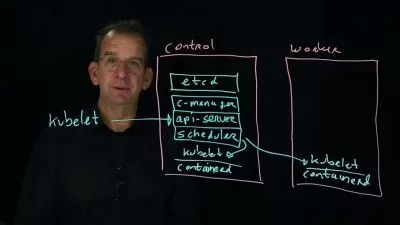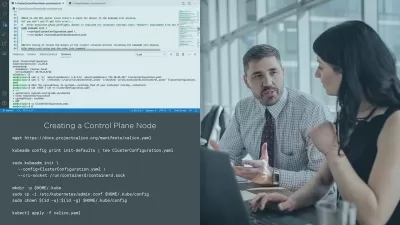Learn KEDA (Kubernetes Event-driven Autoscaling)
Pritesh Mistry
1:33:40
Description
Learn KEDA (Kubernetes Event-driven Autoscaling) by Examples
What You'll Learn?
- How to install and set up KEDA in a Kubernetes cluster
- How to configure KEDA to scale applications based on a variety of event sources
- How to create and deploy ScaledObjects, which tell KEDA which resources to scale
- How to troubleshoot common issues and errors that may arise when using KEDA
- Best practices for using KEDA to scale your Kubernetes applications
Who is this for?
More details
DescriptionKubernetes has emerged as the de facto standard for container orchestration, providing a powerful platform for deploying and managing containerized applications. However, scaling Kubernetes applications can be a complex and time-consuming process, especially as traffic levels fluctuate and demand increases. KEDA (Kubernetes-based Event Driven Autoscaling) is a powerful tool that helps automate the scaling process by enabling you to scale your applications based on a variety of event sources, such as message queues, webhooks, and custom events.
This course is designed to help intermediate-level Kubernetes users and experienced developers learn how to use KEDA to automatically scale their applications in response to incoming events. You'll start by learning the basics of event-driven architectures and the benefits of using event-driven autoscaling to create more efficient and cost-effective Kubernetes applications. You'll then dive into the technical details of KEDA, learning how to install and set up KEDA in a Kubernetes cluster, configure ScaledObjects to tell KEDA which resources to scale, and use event sources to trigger scaling actions.
Throughout the course, you'll work with real-world examples and hands-on exercises to gain a deeper understanding of KEDA and how to use it to scale your Kubernetes applications. You'll also learn how to troubleshoot common issues and errors that may arise when using KEDA, as well as best practices for integrating KEDA with other tools and services in your Kubernetes environment.
By the end of the course, you'll have a solid grasp of KEDA and event-driven autoscaling, as well as the skills and knowledge needed to scale your Kubernetes applications with confidence and ease. Whether you're a developer, DevOps engineer, or IT professional, this course will provide you with valuable insights and expertise to help you take full advantage of KEDA and its many benefits.
Who this course is for:
- Beginners who want to use keda in event driven application
Kubernetes has emerged as the de facto standard for container orchestration, providing a powerful platform for deploying and managing containerized applications. However, scaling Kubernetes applications can be a complex and time-consuming process, especially as traffic levels fluctuate and demand increases. KEDA (Kubernetes-based Event Driven Autoscaling) is a powerful tool that helps automate the scaling process by enabling you to scale your applications based on a variety of event sources, such as message queues, webhooks, and custom events.
This course is designed to help intermediate-level Kubernetes users and experienced developers learn how to use KEDA to automatically scale their applications in response to incoming events. You'll start by learning the basics of event-driven architectures and the benefits of using event-driven autoscaling to create more efficient and cost-effective Kubernetes applications. You'll then dive into the technical details of KEDA, learning how to install and set up KEDA in a Kubernetes cluster, configure ScaledObjects to tell KEDA which resources to scale, and use event sources to trigger scaling actions.
Throughout the course, you'll work with real-world examples and hands-on exercises to gain a deeper understanding of KEDA and how to use it to scale your Kubernetes applications. You'll also learn how to troubleshoot common issues and errors that may arise when using KEDA, as well as best practices for integrating KEDA with other tools and services in your Kubernetes environment.
By the end of the course, you'll have a solid grasp of KEDA and event-driven autoscaling, as well as the skills and knowledge needed to scale your Kubernetes applications with confidence and ease. Whether you're a developer, DevOps engineer, or IT professional, this course will provide you with valuable insights and expertise to help you take full advantage of KEDA and its many benefits.
Who this course is for:
- Beginners who want to use keda in event driven application
User Reviews
Rating
Pritesh Mistry
Instructor's Courses
Udemy
View courses Udemy- language english
- Training sessions 16
- duration 1:33:40
- Release Date 2023/04/10









